Helps for Translators, 8 vols. (UBS Technical Helps)
Digital Logos Edition
The United Bible Societies are renowned for their scholarship in the fields of translation theory and practice. The Helps for Translators collection brings together a wide range of their practical tools for Bible translators. Find helpful translation suggestions for common animals and plants mentioned in Scripture. Learn how to maintain the poetic form of Old Testament passages when you translate them into another language. Explore the semantic range of Greek vocabulary with helpful lexical tools. Ideal for translators, teachers, or students, this collection provides the tools you need to undertake an in-depth study of biblical languages.
Volumes in the UBS Technical Helps series concentrate on exegetical information for translators, attempting to indicate possible solutions for translational problems related to language or culture without attempting to provide help that other theologians and scholars may seek but which is not directly related to the translation task.
For more help with Bible translation, check out the UBS New Testament Handbooks.

- Provides practical tips for translating the Bible
- Includes semantic and lexical tools
- Presents translation principles for scholars, teachers, students, and lay people
- Title: Helps for Translators
- Publisher: United Bible Societies
- Volumes: 9
- Pages: 1,437
- Christian Group: Evangelical
- Resource Type: Reference
- Topic: Translation
- Resource ID: {34D58E42-1FCF-4D3B-A57A-CDAE3F17DDA7}
Individual Titles
- Helps for Translators: Bible Index by Robert G. Bratcher and John A. Thompson
- Helps for Translators: Fauna and Flora of the Bible
- Helps for Translators: Hebrew Poetry in the Bible by Ernst R. Wedland and Lynell Zogbo
- Helps for Translators: Lexical Semantics of the Greek New Testament by Eugene A. Nida and Johannes P. Louw
- Helps for Translators: Marginal Notes for the New Testament by Robert G. Bratcher
- Helps for Translators: Marginal Notes for the Old Testament by Robert G. Bratcher
- Helps for Translators: Old Testament Quotations in the New Testament by Robert G. Bratcher
- Helps for Translators: Short Bible Reference System by Robert G. Bratcher
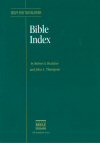
This index provides a model for the preparation of Bible indexes in other languages. Though based on the Revised Standard Version, the choice of themes and selection of references reflect the basic concepts in the underlying Greek and Hebrew. For this reason, the material can be adapted to an index for another language with a minimum of adjustment and restructuring.
Robert G. Bratcher (1920–2010) received his ThM and ThD from Southern Baptist Theological Seminary in Louisville, Kentucky. He is the author of several volumes in the UBS Handbook Series, coauthor of A History of Bible Translation and the North American Contribution, and served as a translator of the Good News Bible for the American Bible Society.
John A. Thompson (1947–2002) was the first director of the Australian Institute of Archaeology in Melbourne, Australia. He lectured at the School of Middle Eastern Studies at the University of Melbourne, and was lecturer in Old Testament studies at the Baptist Theological College of New South Wales. He held degrees from the University of Queensland and the University of Melbourne, and received a doctorate in Oriental studies from the University of Cambridge.
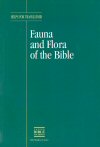
This illustrated book suggests equivalent terms for different plants and animals mentioned in the Bible. Each entry is accompanied by the species’ scientific name, a short description, biblical references, and more. This edition provides indexes of Greek, Hebrew, and Aramaic terms; biblical references; English and Latin terms; and more.
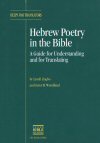
Translating poetry is the ultimate challenge for Bible translators—and a common one: nearly one-third of the Old Testament is in poetic form. Written for translators with little or no background in Hebrew, this practical guide suggests ways translators can compare the stylistic techniques of the Hebrew text with those in their own language. In this way, they can create the same poetic effect in their own translations. It points out typical problems that Old Testament translators face and suggests ways to set out the text that will help the reader.
Ernst R. Wendland has taught at the Lutheran Seminary in Lusaka, Zambia since 1968 and is a retired United Bible Societies translation consultant. He is an external examiner in Zambian languages at the University of Zambia and a visiting professor in the Department of Ancient Studies at the University of Stellenbosch in South Africa. He is the author of numerous studies on the Bantu languages of South Central Africa, biblical exegesis, literary-poetic analysis, rhetorical criticism, and translation theory and practice.
Lynell Zogbo is an author, editor, and African language specialist. She served in Africa for 28 years as a consultant for the United Bible Societies.
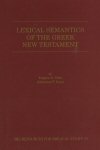
This analysis of the lexical semantics of the Greek New Testament provides scholars, translators, and students the principles and procedures employed in the preparation of the Greek-English Lexicon of the New Testament Based on Semantic Domains. It includes an introduction to lexicology as illustrated by a number of issues involved in treating the meanings of words and idioms in the New Testament. Although it presupposes a considerable knowledge of Greek, it is not designed merely for New Testament specialists; anyone interested in the problem of lexical meaning and exegesis will find it helpful.
Eugene A. Nida (1914–2011) was a renowned Bible translator and linguist. He worked with the American Bible Society and was a founding member of Wycliffe Bible Translators. Nida is considered a pioneer of linguistics and translation theory, and the developer of the theory of dynamic-equivalence in Bible translation. He coauthored the Greek-English Lexicon of the New Testament Based on Semantic Domains, and wrote over a dozen other works on translation, missions, and linguistics.
Johannes P. Louw (1932–2011) was a linguistic scholar and expert in Bible translation. He was the editor of Greek-English Lexicon of the New Testament Based on Semantic Domains and created the South African discourse analysis approach to linguistics. Throughout his career he contributed to numerous publications including the Anchor Yale Bible Dictionary (6 vols.), Harper’s Bible Dictionary, and the Oxford Companion to the Bible.
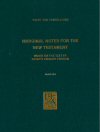
These notes on the translation choices made in the Good News Bible provide a case study for readers working on their own translations. The notes include comments on textual variants, translational alternatives, linguistics, culture, people, historical events, places, dates, and references to other passages.
Robert G. Bratcher (1920–2010) received his ThM and ThD from Southern Baptist Theological Seminary in Louisville, Kentucky. He is the author of several volumes in the UBS Handbook Series, coauthor of A History of Bible Translation and the North American Contribution, and served as a translator of the Good News Bible for the American Bible Society.
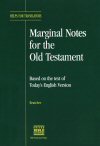
These notes on the translation choices made in the Good News Bible provide a case study for readers working on their own translations. The notes include comments on textual variants, translational alternatives, linguistics, culture, people, historical events, places, dates, and references to other passages.
Robert G. Bratcher (1920–2010) received his ThM and ThD from Southern Baptist Theological Seminary in Louisville, Kentucky. He is the author of several volumes in the UBS Handbook Series, coauthor of A History of Bible Translation and the North American Contribution, and served as a translator of the Good News Bible for the American Bible Society.
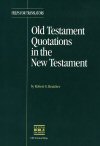
This book helps translators preserve the right relationships between Old Testament quotations in the New Testament and their sources. It encourages translators to render an accurate representation of what the New Testament writers intended to convey. This volume helps translators find general meaning equivalents between Old and New Testament passages, when those passages are parallel.
Robert G. Bratcher (1920–2010) received his ThM and ThD from Southern Baptist Theological Seminary in Louisville, Kentucky. He is the author of several volumes in the UBS Handbook Series, coauthor of A History of Bible Translation and the North American Contribution, and served as a translator of the Good News Bible for the American Bible Society.
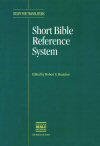
This book helps translators understand the source of quotations, related or parallel historical events, obviously similar treatments of corresponding themes, and allusions to events, themes, or persons throughout the Bible. It is an invaluable resource for translators preparing footnotes and cross-references for Scripture translations.
Robert G. Bratcher (1920–2010) received his ThM and ThD from Southern Baptist Theological Seminary in Louisville, Kentucky. He is the author of several volumes in the UBS Handbook Series, coauthor of A History of Bible Translation and the North American Contribution, and served as a translator of the Good News Bible for the American Bible Society.
This title is included in the following collections
You can save when you purchase this product as part of a collection.
2025 아카데믹 다이아몬드 서재
$3,149.99$2,677.492025 Researcher Diamond Librar...
$2,999.99$2,999.992025 Messianic Jewish Diamond
$2,999.99$2,999.992025 Orthodox Diamond
$2,999.99$2,999.99
- $4,899.99$4,164.99
- $4,749.99
- $4,749.99
- $4,749.99
- $23,999.99
Reviews
2 ratings


Faithlife User
2/8/2018

Claude Brown Jr
2/3/2017